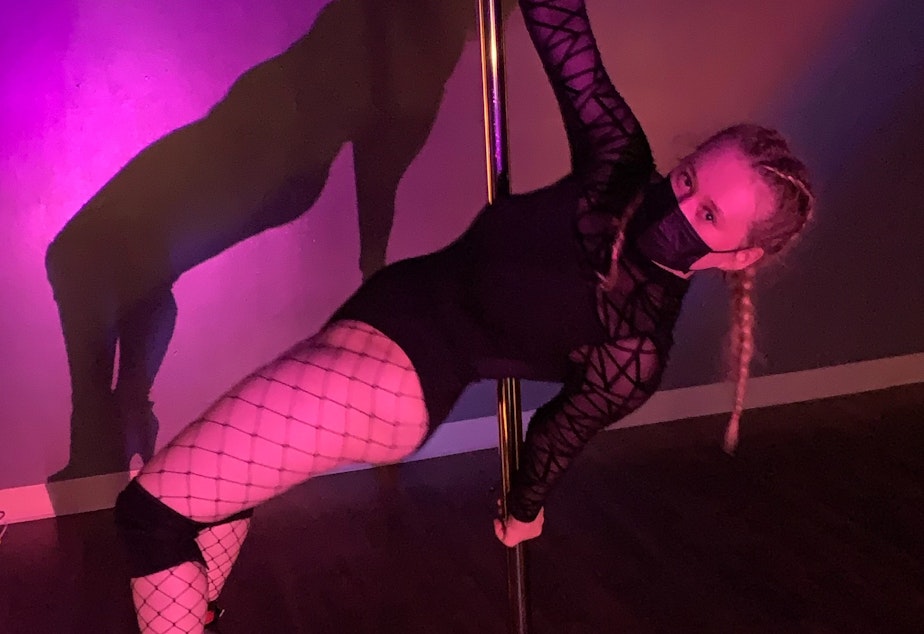How I found bodily autonomy through pole dancing
For RadioActive's Morgen White, pole dancing is a sanctuary.
White is a 20-year-old college student, and she says taking pole dancing classes has boosted her confidence and helped her appreciate herself as a sexual being. In this essay, she reflects on the importance of being fully herself in front of others who respect and value her body as her own.
This is a story about sexuality, and it briefly mentions sexual trauma.
[RadioActive Youth Media is KUOW's radio journalism and audio storytelling program for young people. This story was entirely youth-produced, from the writing to the audio editing.]
W
hen I was younger, I didn't really think about my sexuality or what I wanted from it. But I started to get a lot of attention. This led me to one of my first sexual experiences, which was negative and non-consensual.
This experience held me back from feeling grounded in my body and sexuality. Although it happened years ago, my ability to feel completely comfortable in my body had eroded. I was uncomfortable with the idea of my body even being sexual. And all this contributed to me having body image issues.
A few months ago, I stumbled across a YouTube video by The Try Guys called “Guys Try Pole Dancing For The First Time."
Sponsored
The video was really funny, but it also covered some serious topics. I never thought that pole dancing could have anything to do with reclaiming your own body.
Some of the teachers talked about their own healing from trauma through pole dancing. So I decided to try it.
I looked up the nearest pole dancing studio and took my first class.
My best friend, Anna Hurtado, said she saw me change after I started pole dancing classes.
Sponsored
"I’ve seen your confidence go way up," Hurtado said. "You started walking with more confidence and talking with more confidence and acting with more confidence. It was like a really significant change, and I was really impressed. And I was like, 'Oh my god, I have to try this.'”
So she tried it too.
“It was so much fun," she said. "It was the most positive and safe environment I’ve ever been in. Everyone was so supportive. I felt safe to be sexual in a way I never have before. I felt free to be a sexual being without being sexualized. It was so freeing."
But not everyone is supportive. My experience pole dancing has come with negative opinions — and oftentimes discomfort — from others.
People in my life have told me to keep quiet about the fact that I take pole dancing classes. I've been told to expect unwanted sexual comments from others because I take the classes. And people have applauded my interest in pole dancing fitness classes, while at the same time demonizing stripping and sex work.
Sponsored
After a couple months of classes, I had a breakthrough.
The opinions of others fell away when I decided to dance to "Power" by Billie Eilish in front of my classmates. This song was particularly powerful in my pole journey because it felt as if it were telling my trauma story.
I was finally able to show what I was feeling when I danced to the song, and it released something in me that had weighed me down for years.
I've now been pole dancing for nine months, and I've learned a lot.
It's been eye-opening seeing the discomfort people feel towards pole dancing and sexuality in general, and the negativity society seems to have toward sex work.
Pole dancing is rooted in sex workers’ spaces and communities. I cannot celebrate pole dancing without celebrating sex workers.
Sponsored
My experience as someone who came to pole dancing as a hobby in a studio is completely different from someone who learned pole dancing as a job, to pay rent and put food on the table.
The fact that I can tell my story of healing through pole dancing — when so many sex workers are silenced or dismissed when they try to talk about their trauma — says a lot about the balance of power in society.
That's where I am in my pole dancing journey now: learning about pole's roots in sex work, listening to sex workers and supporting sex workers' rights.
This story was produced in a RadioActive Youth Media Advanced Producers creative audio workshop for high school and college-age youth. Production assistance by Dayana Capulong and Iz Ortiz. Voice acting by Emily Chua, Antonio Nevarez and Lucas Galarneau. Prepared for the web by Kelsey Kupferer. Edited by Mary Heisey.
Special thanks to Stacey Clare who provided consultation support. Her book, "The Ethical Stripper," helped inform this story.
Sponsored
Thanks also to Selena The Stripper, who provides tips about club etiquette and tips for strippers on Instagram @prettyboygirl, and to Jacqueline Frances, author of “Striptastic!" And if you are interested in buying high heels or other pole dancing accessories made by strippers, for strippers, check out @clubhellaheels on Instagram. It's a great way to support the community.
Find RadioActive on Instagram, Twitter, TikTok, YouTube and Facebook, and on the RadioActive podcast.
Support for KUOW's RadioActive comes from the Bill & Melinda Gates Foundation Discovery Center and BECU.
If you have any feedback on this story, you can email RadioActive at radioactive@kuow.org, or fill out the box below. Reach out, we're listening.



